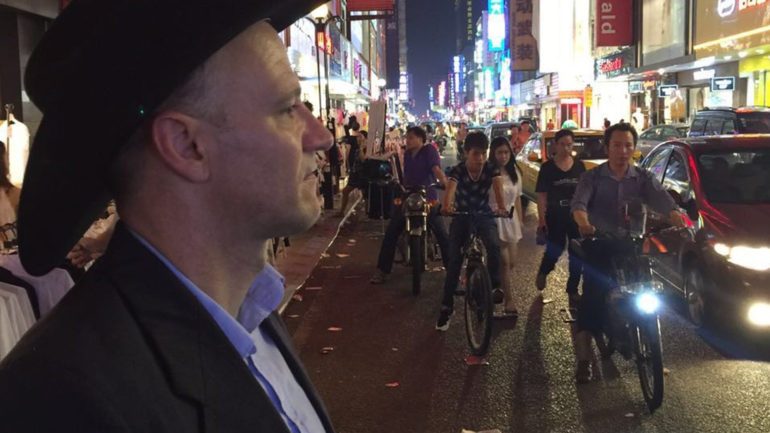Film Review: ‘Ghostbox Cowboy’
By Dennis Harvey
LOS ANGELES (Variety.com) – Wild West capitalism hits the Far East with a vengeance in documentarian John Maringouin’s adventuresome first narrative feature, “Ghostbox Cowboy.” This original if sometimes befuddling vision blurs the line between fiction and documentary elements, conventional storytelling and improvisational collage, all to oft-bracing effect. Starring indie-cinema regulars David Zellner and Robert Longstreet as Yank hustler-entrepreneurs wading into the financially frenetic waters of the People’s Republic, it’s a freewheeling absurdist parable that might be dubbed “Fear and Loathing in the Chinese Economic Miracle.”
Though by its very nature somewhat uneven and unwieldy, what Maringouin has wrought here has a kind of exhilarating chaos to it, something comparable to relatively few prior films. Alexsey German’s just-restored 1998 “Khrustalvoy, My Car!” and the prime-time Fellini of “8 1/2” come to mind as similar phantasmagorias of modernity’s institutions run amuck. (You could also cite Richard Kelly’s “Southland Tales,” but there, ambition outpaces grasp.)
Appropriately for the era it depicts, “Ghostbox” has a much more jittery, digital aesthetic than those movies, as if shot on a camera phone. (According to the director, what was actually used were “hacked DSLR cameras” sufficiently resembling phones to enable guerilla-style shooting in public settings.) But that’s not to say it’s some sort of unwatchable amateurish hash. Indeed, there’s so much information onscreen — particularly in the complex sound design — and buried in the cryptic tale, some spectators will seek repeat viewings to better unpack the dense layers of sense and nonsense here.
We first meet protagonist Jimmy Van Horn (Zellner) in “The American Blank Region,” where he appears to be a humble guy upon whom it dawns — while perusing the aisles of a dollar store — that just about every bit of cheap crap in the world bears the inscription “Made In China.”
Next thing we know, he’s landed in that industrially booming nation himself, at the invitation of old acquaintance Bob Granger (Longstreet), who has disconcertingly donned a blond wig and seemingly shed 20 years since last seen. Bob is the purported CEO of Freedentures.com, just one among myriad daft schemes he’s riding like a wild pony in the high-stakes rodeo of Chinese investment. He seems well-connected, introducing cowboy-hatted Jimmy to blustering factory owner Vincent Xie, a self-proclaimed expat American “genius” known as Specialist, big-league investors, and others — many playing caricatures of themselves, under their own names.
What Jimmy has to sell is a crazy idea: Something called Ghostr, an electronic device that can (in theory) communicate with the dead. But then Shenzhen, in the Guangdong Province, is a crazy place. “Thirty years ago, this was a fishing village,” one character says while overlooking the current sprawl of endless development, commerce, and an estimated 20 million residents. It’s been called “the next Silicon Valley,” but seems more a cross between “Blade Runner” and an infinite strip-mall. Money does appear to grow on trees here, and while he’s the new kid in town, Jimmy gets swept up in a whirlwind of hedonistic excess and seemingly guaranteed wealth.
But just as abruptly, he’s dropped from that dizzying height, Bitcoin-less and disgraced. Trying to salvage his lapsed luck, he goes on a “Heart of Darkness”-like quest to find the mysterious Johnny Mai Thai (J.R. Cazet), who seems to hold the key to his fate. Meanwhile, Bob has been exposed as considerably less than the entrepreneurial superstar he’s pretended to be, getting reduced to impersonating a fictional American cowboy actor as entertainment at the huge wedding of some nouveau riche types.
Particularly in its darker second half, “Ghostbox” wavers in and out of narrative focus, experiencing spurts and dearths of energy. But these don’t seem weaknesses so much as further evidence of commitment to an almost impenetrable agenda — one that intrigues much more than it frustrates, even if it can only end on a wholly ambiguous note. Maringouin’s acclaimed documentary features were also heady journeys into alien territory, whether his own parents’ bizarrely dysfunctional domesticity (“Running Stumbled”), a troubled athlete’s obsessive conquest of the Amazon (“Big River Man”), or the disorientation of one’s own country plunging into ill-justified war (“Just Another Day in the Homeland”). Their nonfiction currents of madness, metaphor, and everyday surrealism are fully present in this unclassifiable contraption, in which scripted black comedy and the accidentally “found” kind are often impossible to separate.
You’d be hard-pressed to pin just what holds the whole Rube Goldbergian enterprise together, let alone what it ultimately “means.” Yet somehow the center does hold, helped a great deal by the flexibility, comic esprit, and pathos that leads Zellner and Longstreet bring. They’re supported by a large gallery of turns no less vivid for being variably professionally “acted.”
Packed with sonic and visual intel, though never crossing the line into ADD cinema, “Ghostbox” turns a sometimes raw look to its advantage. But it also benefits greatly from enormous spectacle accessed (one assumes) gratis, with or without permission. That factor ranges from Shenzhen’s purgatorial overload of flashy consumer outlets to an even newer city to the North that busted before it could boom — an empty metropolis abandoned due to either fickle economics or (it’s hinted) some disaster’s radioactive aftermath. All Maringouin’s design and other major crew collaborators contribute elements of unpredictable wit and invention.

